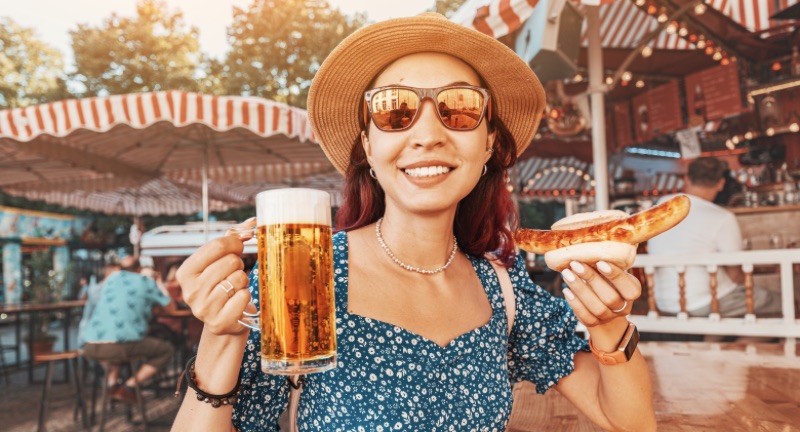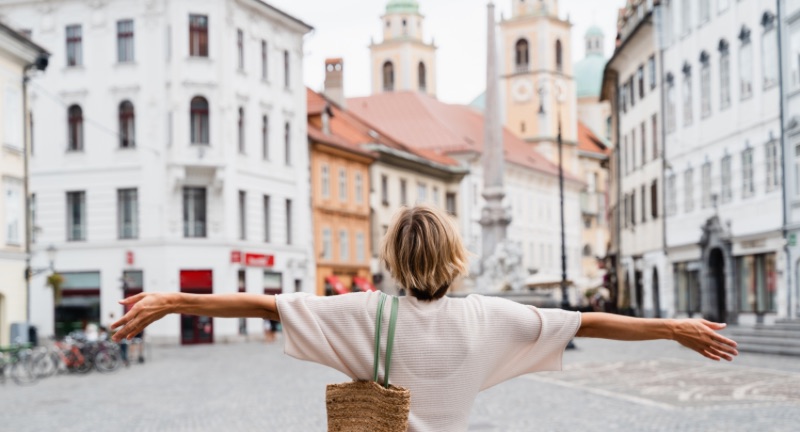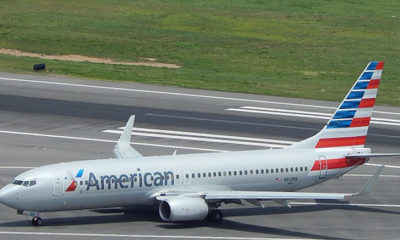NEWS
23 Handy German Phrases Every First-Time Visitor Should Learn
Published
2 weeks agoon

Shutterstock
Traveling to a new country can be both exhilarating and daunting, especially when navigating through a language barrier. Germany, with its rich culture and vibrant cities, welcomes millions of visitors each year, many of whom are eager to immerse themselves in the local experience. Learning a few key phrases can transform your trip, making interactions smoother and more meaningful.
Whether you’re ordering a coffee, asking for directions, or simply greeting a new friend, having the right words at your fingertips can enhance every moment of your journey. Embrace the adventure with confidence by mastering these essential German expressions that will help you connect and communicate with ease.
Hallo (Hello)

Shutterstock
“Hallo” is the most common way to greet someone in Germany and is universally understood. It works perfectly in informal situations or when meeting someone new. This friendly, approachable word makes it easier to strike up a conversation. Combine it with a smile to leave a positive impression, whether you’re meeting locals or fellow travelers.
Guten Tag (Good Day)

Shutterstock
“Guten Tag” is a more formal greeting that’s suitable for various social settings, especially during the daytime. Use it when entering shops, restaurants, or addressing someone you don’t know well. For specific times of day, you can adjust to “Guten Morgen” (Good Morning) before noon and “Guten Abend” (Good Evening) after 6 p.m. Showing respect through these greetings will make you seem considerate and culturally aware.
Tschüss (Bye)

Shutterstock
When leaving a casual setting, “Tschüss” is the perfect way to say goodbye. It’s informal and widely used, whether you’re leaving a café or parting ways with new friends. For more formal occasions, use “Auf Wiedersehen,” which is slightly more structured. Adding a cheerful “Tschüss” at the end of an encounter can make it memorable and amicable.
Bitte (Please)

Shutterstock
“Bitte” is one of the most versatile words in German and is used in multiple contexts. You’ll hear it as “please” when requesting something, “you’re welcome” as a polite response, or “here you go” when handing something over. Its flexibility makes it crucial for polite interactions. Mastering its use ensures you’ll navigate social exchanges smoothly and respectfully.
Danke (Thank You)

Shutterstock
Expressing gratitude is essential, and “Danke” is your go-to word in German. For added emphasis, say “Dankeschön,” which means “thank you very much.” Whether someone gives you directions or serves your meal, showing appreciation will make people more willing to assist you. Germans value politeness, and a simple “Danke” can go a long way in fostering goodwill.
Entschuldigung (Excuse Me)

Shutterstock
“Entschuldigung” is a polite way to catch someone’s attention or apologize for a small mistake. Use it to say “excuse me” when you need help or want to pass through a crowded space. It can also mean “I’m sorry” in casual contexts, such as bumping into someone accidentally. This word shows you’re considerate and mindful of others around you.
Ich spreche kein Deutsch (I Don’t Speak German)

Shutterstock
When you’re struggling with the language, this phrase helps set expectations politely. It signals to locals that you may need assistance or an English explanation. Saying this phrase shows that you’re respectful of their language while being honest about your limitations. Follow it up with “Sprechen Sie Englisch?” to see if they can switch to English.
Wo ist…? (Where Is…?)

Shutterstock
“Wo ist…” is an essential question for finding your way in unfamiliar places. You can attach words like “die Toilette” (the bathroom) or “der Bahnhof” (the train station) to customize your query. Germans appreciate clarity, and this phrase gets straight to the point. It’s a lifesaver in situations where you’re lost or in urgent need of something.
Ich verstehe nicht (I Don’t Understand)

Shutterstock
When you’re confused, admitting “Ich verstehe nicht” encourages the speaker to simplify or switch to English. It’s a straightforward phrase that saves time and avoids misunderstandings. Germans are generally direct but accommodating when they see you’re making an effort. Adding “bitte” shows extra politeness.
Wie viel kostet das? (How Much Does This Cost?)

Shutterstock
Shopping and dining become easier when you know how to ask for prices. “Wie viel kostet das?” works in stores, markets, or restaurants when pointing to an item. It’s polite and shows that you’re trying to engage in German. Don’t forget to follow up with “Danke” after receiving the answer.
Ich hätte gern… (I Would Like…)

Shutterstock
This phrase is your best friend when ordering food or drinks in German-speaking countries. For example, you can say, “Ich hätte gern einen Kaffee” (I would like a coffee) to place an order. It’s polite, clear, and shows effort to use the local language. Practicing this phrase before your trip will help you feel more confident in restaurants and cafés.
Können Sie mir helfen? (Can You Help Me?)

Shutterstock
Asking for help is easy with this phrase, especially when navigating unfamiliar cities. Germans are often willing to assist if approached politely. Use this phrase for directions, translations, or advice on local attractions. A friendly tone and a smile can make people more receptive to your request.
Wo ist die nächste U-Bahn? (Where Is the Nearest Subway?)

Shutterstock
Public transportation is a key part of travel in Germany, and this phrase helps you locate the nearest subway station. You can replace “U-Bahn” with “Bushaltestelle” (bus stop) or “Straßenbahn” (tram) depending on your needs. Locals can give you clear directions or recommend alternative routes. Having a transit map or app will make your journey even smoother.
Ich habe mich verlaufen (I’m Lost)

Shutterstock
If you’re disoriented, admitting “Ich habe mich verlaufen” is the first step to finding your way. It’s a direct and honest way to communicate your situation. Most Germans will empathize and offer guidance to help you get back on track. Pair it with location-specific questions like “Wo ist der Hauptbahnhof?” for more precise assistance.
Die Rechnung, bitte (The Check, Please)

Shutterstock
When dining out in Germany, asking for the bill requires this phrase. Unlike in some countries, waitstaff won’t bring the check until you request it. Saying “Die Rechnung, bitte” is polite and signals that you’re ready to pay. It’s a small detail, but mastering it makes dining experiences smoother.
Gibt es WLAN hier? (Is There Wi-Fi Here?)

Shutterstock
Staying connected is important, and this phrase helps you find Wi-Fi access. Many cafés, restaurants, and hotels offer Wi-Fi, but it’s better to confirm with this question. Pronouncing “WLAN” as “Vey-Lahn” helps you sound more natural. Locals may also assist with passwords or network names.
Wie spät ist es? (What Time Is It?)

Shutterstock
Timekeeping is crucial when traveling, and this phrase ensures you stay punctual. Germans are known for their value of punctuality, so knowing the time is important. Use this phrase when navigating schedules for trains, tours, or reservations. Locals will typically respond quickly and helpfully.
Es tut mir leid (I’m Sorry)

Shutterstock
This phrase is a polite way to apologize for small mistakes or misunderstandings. Use it when bumping into someone, being late, or any minor mishap. Germans value sincerity, so saying “Es tut mir leid” conveys accountability and respect. Pair it with a warm tone for better acceptance.
Haben Sie…? (Do You Have…?)

Shutterstock
This question is versatile for finding specific items or services. For instance, ask “Haben Sie vegetarische Optionen?” (Do you have vegetarian options?) in a restaurant. It’s a polite way to inquire without being too demanding. A clear and friendly approach ensures effective communication.
Können Sie das wiederholen? (Can You Repeat That?)

Shutterstock
If someone speaks too quickly, this phrase helps you ask them to slow down or repeat. It’s especially useful when you’re trying to grasp directions or instructions. Locals often appreciate your effort to understand their language. A little patience from both sides goes a long way.
Prost! (Cheers!)

Shutterstock
“Prost!” is the quintessential phrase for toasting in Germany, especially during social gatherings. It’s a fun way to connect with locals and fellow travelers over a drink. Always make eye contact when saying “Prost!”—it’s an important cultural custom. Using this phrase adds an element of camaraderie and festivity.
Wie komme ich nach…? (How Do I Get To…?)

Shutterstock
This phrase is indispensable for navigating German cities or finding attractions. Replace “nach” with specific destinations, like “zum Flughafen” (to the airport) or “ins Stadtzentrum” (to the city center). Locals can provide directions or transport tips tailored to your needs. Carrying a map or app ensures you understand their guidance.
Alles Gute! (All the Best!)

Shutterstock
Ending conversations with “Alles Gute” leaves a positive impression. It’s versatile and works in various contexts, such as farewells, birthday wishes, or general good luck. This simple phrase demonstrates warmth and friendliness in any interaction. It’s an easy way to show respect and connect with people on a personal level.
Conclusion

Shutterstock
Traveling to Germany for the first time is an exciting adventure filled with new experiences and opportunities to connect with locals. By learning these 25 essential German phrases, you’ll not only navigate daily interactions with ease but also show respect for the local culture. These simple expressions can open doors to meaningful conversations, enhance your travel experiences, and make your stay more enjoyable. Embrace the language, practice these phrases, and watch as your confidence grows, allowing you to fully immerse yourself in the vibrant German lifestyle. Safe travels and Viel Glück!
More From Bon Voyaged
-


Check Out Kourtney Kardashian’s Lavish Vacation Rental
-


California Theme Park Cracking Down on Unruly Teen Brawls
-


Disney Launching Once-in-a-Lifetime Cruise to Antarctica
-


Tom Brady Signs Mega Million Dollar Deal with Fox Sports
-


Top 10 Music Festivals You Have to Check Out
-


Carnival Cruise Ships Land Nick Jonas as Cruise Entertainer
-


Walt Disney World Brings Back Florida Resident Ticket Deal
-


Walt Disney World Relaxes Mask Mandate for Photos
-


Royal Caribbean to Honor Unlimited Drinks Price Snafu
-


Housekeeper Finds Unexpected Slithery Guest in Hotel Bed
-


Amazon’s Jeff Bezos Heading to Space
-


Free Apple Music Streaming Coming to American Airlines

